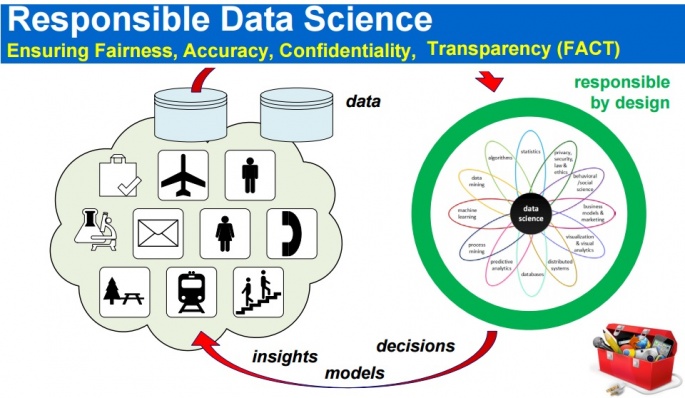Responsible Data Science. Ensuring Fairness, Accuracy, Confidentially, Transparency (FACT)
03/01/2017


Image credit: ‘Responsible Data Science: Ensuring Fairness, Accuracy, Confidentiality, and Transparency’ (FACT), slides, 2016.
Responsible Data Science (RDS) consortium was launched in 2016 to tackle ethical and legal challenges, and develop data science techniques, infrastructures and approaches that are responsible for fair, accurate, confidential, transparent (FACT) data by design.
_____________________________________________________________________________________________________
“The ‘Age of Data’ continues to thrive, with data being produced from all industries at a phenomenal rate that introduces numerous challenges regarding the collection, storage and analysis of this data” (European Data Science Academy).
“Data abundance combined with powerful data science techniques has the potential to dramatically improve our lives by enabling new services and products, while improving their efficiency and quality. Many of today’s scientific discoveries are already fueled by developments in statistics, data mining, machine learning, databases, and visualization” (Mission. Responsible Data Science (RDS) consortium)).
Although the importance of data science is widely acknowledged, there are also great concerns about the publishing and the use of data. Unfair or biased conclusions, disclosure of private information, and non-transparent data use, may inhibit future data science applications.
The key issues regarding science data are:
- Could data be without prejudice? How to avoid unfair conclusions even if they are true?
- Could data be without guesswork? How to answer questions with a guaranteed level of accuracy?
- Could data ensure confidentiality? How to answer questions without revealing secrets?
- Could data provide transparency? How to clarify answers such that they become indisputable?
To tackle these challenges, a number of expert research groups from multiple disciplines (like data/process mining, digital humanities, ethics, information retrieval, knowledge representation, law, machine learning, natural language processing, security, statistics, and visualization) and knowledge institutions across the Netherlands started (in 2016) the Responsible Data Science (RDS) consortium.
# Introduction & Overview on Responsible Data Science (slides of RDS Seminar Series - 2016)
# Responsible Data Science: What’s Law Got To Do With It? (slides of RDS Seminar Series - 2017)
To address the aforementioned issues, the RDS initiative is focused on the core principles of Responsible Data Science - Fairness, Accuracy, Confidentially, Transparency (FACT).
# Visualization for Transparency (slides of RDS Seminar Series - 2017)
The RDS project is unique in that it will:
- develop methods and techniques to support the publishing and use of the FACT data – or rather responsible (Big or small) data - without inhibiting the power of data science;
- provide the technology to safeguard FACT core data principles by design;
- create a nation-wide multi-disciplinary platform focusing on challenges related to data science and Big data.
Results of the RDS program will develop:
- new data science concepts,
- novel analysis and data management techniques,
- powerful software tools and infrastructures, and
- RDS education and training.
The RDS team is committed to provide the means to use data in a truly responsible manner.
Source: Responsible Data Science (RDS) initiative
_____________________________________________________________________________________________________
Related contents:
- To share or not to share? On responsibility in social software (slides of RDS Seminar Series - 2016).
- Dynamic modelling of provenance and perspectives of data (slides of RDS Seminar Series - 2016).
- RDS - Events for January 2017.
- Here you can find a variety of online courses offered by a Horizon 2020 European Data Science Academy (EDSA) project. These courses are designed to develop the needed data skills.
- Put FAIR principles into practice and enjoy your data! (blog post on AIMS).
- RRI Tools: fostering Responsible Research and Innovation (blog post on AIMS).
- Open Science. Citizen Science. Responsible Research and Innovation (slides, European Stakeholders Round Table, 2016).
- EDISON project : building the data science profession.
- Proceedings of 2016 conference on Big Data from Space (BiDS'16).
- Data Skills Matter: The Network of Big Data Centers of Excellence in Europe.
- FREME : Open Framework of e-services for multilingual and semantic enrichment of digital content. Data Management Plan (co-funded by the Horizon 2020).
- European Data Science Conference (2016, Luxembourg).
